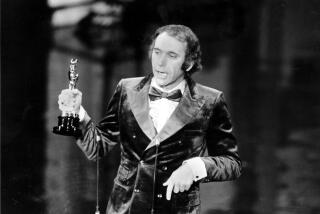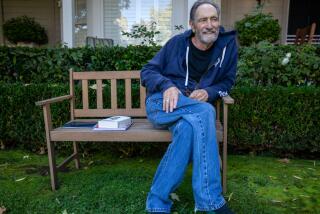AN APPRECIATION : Hal Roach--Last Link to a Glorious Entertainment Era
It is one of the several astonishments of his remarkable longevity that Hal Roach, who died on Monday a few weeks short of his 101st birthday, was older than the movies themselves.
He was already 5 when the movies escaped the peephole penny arcades and began to be projected on the big screens in this country. And while it is fashionable and often accurate to say that the passing of a conspicuous figure marks the end of an era, Hal Roach surely was the last living link to those early days when the motion picture was just beginning to find its muscles and its range as the central art form of the 20th Century.
We are still among men and women who are further defining all that the movies can show and tell and aspire to, but they are building on the foundations laid down long ago by creators as widely and wildly different as D. W. Griffith and Hal Roach.
In comedy, as a serious joke said a few seasons ago, timing is everything. Roach’s timing, from his first days to his last, was perfect. The Hollywood he wandered into as a mule skinner turned truck driver, looking for an easier way to earn five bucks a day, was a dusty boom town rushing out all the product it could for a seemingly unquenchable public thirst for the new flicks.
Not for long would there be an enterprise (not yet anything like an industry) so fluid that you could be an extra one day, an assistant the next, a director the day after. Roach’s entree, he remembered, was a gambling scene in which nobody knew that the roulette wheel and the ball should go in opposite directions. Roach, still not into his 20s, hadn’t knocked about Alaska for nothing. He set the dudes straight and was on his way.
Partnered with a local real estate man, he formed his own production company. (Whenever, later, could it have been done so cheaply? His timing was perfect.) His fellow extra and first star, Harold Lloyd, was not a comedian, Roach said later, but he was a fine comic actor who could do anything. “We never got anyplace with him until we put the glasses on him,” Hal told me at the time of his 100th birthday.
Roach had a flair for what he called gags--sight gags, as they were in silent days, not one-liners. Unlike many of the other creators of the early days, with the notable exception of Charlie Chaplin, Roach was a clever businessman who quickly bought out his partner and, with the earnings of the Lloyd shorts, started the famous Hal Roach Studios in Culver City, which endured into the vastly different Hollywood of the 1950s.
Having united Stan Laurel and Oliver Hardy to make the most successful comedy team in film history, Roach noted that their contracts came up for renegotiation at different times so he never had to deal with them as a team (and with the leverage that would have given them). “But I don’t think I ever took advantage of them,” Roach said with an innocent smile.
Roach’s gift of gags was also a keen story sense, which in private life was a gift of anecdotage. The experiences of his extraordinary career--the polo, the airplane speed records, the world tours, the famous pals--had been rounded and polished into grand stories.
Did he see from his studio window poor kids playing with scraps of lumber and conceive of “Our Gang” at that very moment? Possibly, or possibly a longer history had been telescoped to make a brisker and more dramatic story. As the obituaries noted, Roach saw the potential of television very early, and produced hundreds of hours of it. “The insatiable desire to be entertained will find its greatest satisfaction in television,” he said in a prepared statement in the late 1940s, when corporate Hollywood was still viewing the new medium with a cloudy mixture of fear and contempt.
Some of the unmade shows he discussed, with titles such as “The Puddle Patch Club,” “Botsford’s Beanery” and “Sadie and Sally,” sound like prophetic versions of shows that came our way later. Roach’s timing faltered for once, although the troubles at the studio he had sold to his son were not of his making.
He lamented the decline of movie comedy, a casualty of the Depression-born double feature that spelled the end of shorts. Only Laurel and Hardy were consistently successful doing full-length comedies. He should have been making four-reel short features, Roach realized later. But the age of the great clowns was ending even faster than the golden times of Hollywood itself.
Roach’s greatest triumph may well be to have lived his century and been around to see and hear his matchless achievements celebrated all over the world. He was honored, among several other places, at the Berlin Film Festival, in his home town of Elmira, N.Y., in Culver City and at the Motion Picture Country Home, which, as the last surviving founder of the Motion Picture Fund, he had helped to build. It seemed poignantly fitting that he should have been cared for at the home’s fine hospital before, at his own request, he went back to his house in Bel-Air to spend his last hours.
In lamenting Hal Roach, we lament as well the passing of that glorious era of those majestic and irreplaceable clowns--Laurel and Hardy high among them--who with and without words made us laugh and cry and recognize our own foolish frailties.
More to Read
Only good movies
Get the Indie Focus newsletter, Mark Olsen's weekly guide to the world of cinema.
You may occasionally receive promotional content from the Los Angeles Times.










